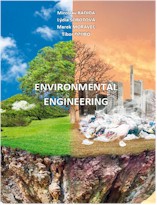|
 |
INTRODUCTION
The stabilized state of the natural environment, which existed millions of years before the first human ancestors appeared on the Earth, is now beginning to change to a slightly destabilized one.
The natural balance is disturbed by human activity. Man disposes of the most powerful and productive tool – his brain and an ability to think. This human ability is further enhanced by highly effective mutual communication between the people. In this way, the fruits of the mental work of a person, as an individual, spread faster and are also realized faster. Unlike other animals and plants, man does not draw from his environment only as much as he necessarily needs for his life, but has created high demands and demands for himself, which he calls the standard of living.
We have neglected in recent decades, our faith in the general power of the mind technology, which can protect a life from any problem, still persists in us, even if it receives great cracks during major natural and anthropogenic disasters. Humanity often uses natural resources disproportionately with its thoughtless activities, irreversibly contaminates the environment, sometimes not only from our point of view, but also from the point of view of future generations.
Humanity also uses natural resources to a large extent to build works that serve several generations and enable the use of alternative and renewable energy sources to an increasing extent (for example, the construction of hydro and wind power plants). The question is whether humanity currently uses and will use the earth’s energy and raw material potential in the future to build sufficient environmentally suitable energy resources for the life of future generations. By this, we mean a process that includes not only the transition from energy production from fossil sources to renewable sources, but also the transition to less energy-intensive technologies and to products that require less energy for their operation. The problem from the point of view of the future is not the lack of energy, but the fact that with the growth of energy production, not only production but also environmental pollution increases.
The external environment represents the interactions of three natural spheres, namely the atmosphere, hydrosphere and pedosphere, as well as the mutual connection with the biosphere. The authors of the monograph focus their attention precisely on this area. They present the results of their long-term scientific and research activities in these areas.
The worldwide problem of surface water pollution is eutrophication, which means the excessive growth of plants and algae in waters with a high content of nutrients, especially nitrogen and phosphorus. In this area, original technical solutions designed by the authors of the monograph are pre
For several years, the authors‘ workplace has focused on the research, prediction and prevention of the spread of the emissions and the immissions of noise, vibrations, non-ionizing radiation, lighting and solid aerosols in the working and living environment. An attention is also focused on the development of methodologies, techniques and technical solutions for
minimizing these emissions and immissions. Selected results of scientific research in this area are presented in the monograph.
Also interesting are the results of scientific research aimed at the research of heavy metals present in the soils. The results are confronted with the research carried out about 10 years ago in an identical location. The presence of heavy metals represents a serious environmental burden.
The attention of the authors of the monograph is focused on the research of the impact of mechanical engineering production on the environment. The results of the scientific research work are presented and focused on „Environmental and Economic Factors and Their Expressions“ and „Environmental Evaluation of Mechanical Engineering Products in Their Conceptual Phase“.
The protection of the environment and the direction towards the development of society, which will enable economic development, increase the standard of living and at the same time preserve nature and resources for future generations, require knowledge of the current state. The result would be a qualitatively and environmentally more acceptable approach to the use of resources, production and consumption, which would not arise on the basis of orders or prohibitions, but on the basis of natural human knowledge, which can be further developed without the threat of sanctions or regulations.
The monograph can be an inspiration for researchers in their subject area of research. At the same time, it can help the new generation orientate in the areas of environmental protection.
Košice, November 2022 Authors
